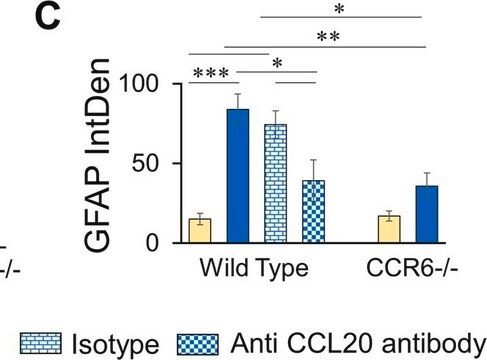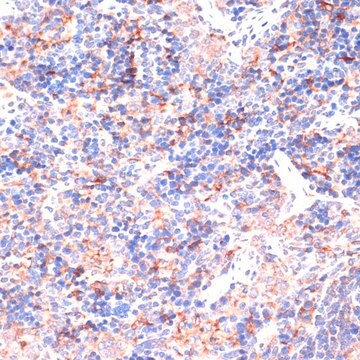MAB5628
Anti-Glial Fibrillary Acidic Protein Antibody
CHEMICON®, mouse monoclonal,
Synonym(e):
GFAP
About This Item
Empfohlene Produkte
Produktbezeichnung
Anti-Glial Fibrillary Acidic Protein Antibody, Chemicon®, from mouse
Biologische Quelle
mouse
Qualitätsniveau
Antikörperform
purified immunoglobulin
Antikörper-Produkttyp
primary antibodies
Klon
monoclonal
Speziesreaktivität
rat, human
Hersteller/Markenname
Chemicon®
Methode(n)
immunocytochemistry: suitable
western blot: suitable
Isotyp
IgG2a
NCBI-Hinterlegungsnummer
UniProt-Hinterlegungsnummer
Versandbedingung
wet ice
Posttranslationale Modifikation Target
unmodified
Angaben zum Gen
human ... GFAP(2670)
Anwendung
Optimal working dilutions must be determined by end user.
Verlinkung
Physikalische Form
Hinweis zur Analyse
Positive: Neural tissue or astrocyte culture
Negative: Non-neural tissue or neuronal culture
Sonstige Hinweise
Rechtliche Hinweise
Sie haben nicht das passende Produkt gefunden?
Probieren Sie unser Produkt-Auswahlhilfe. aus.
Empfehlung
Lagerklassenschlüssel
10 - Combustible liquids
WGK
WGK 2
Flammpunkt (°F)
Not applicable
Flammpunkt (°C)
Not applicable
Analysenzertifikate (COA)
Suchen Sie nach Analysenzertifikate (COA), indem Sie die Lot-/Chargennummer des Produkts eingeben. Lot- und Chargennummern sind auf dem Produktetikett hinter den Wörtern ‘Lot’ oder ‘Batch’ (Lot oder Charge) zu finden.
Besitzen Sie dieses Produkt bereits?
In der Dokumentenbibliothek finden Sie die Dokumentation zu den Produkten, die Sie kürzlich erworben haben.
Unser Team von Wissenschaftlern verfügt über Erfahrung in allen Forschungsbereichen einschließlich Life Science, Materialwissenschaften, chemischer Synthese, Chromatographie, Analytik und vielen mehr..
Setzen Sie sich mit dem technischen Dienst in Verbindung.








